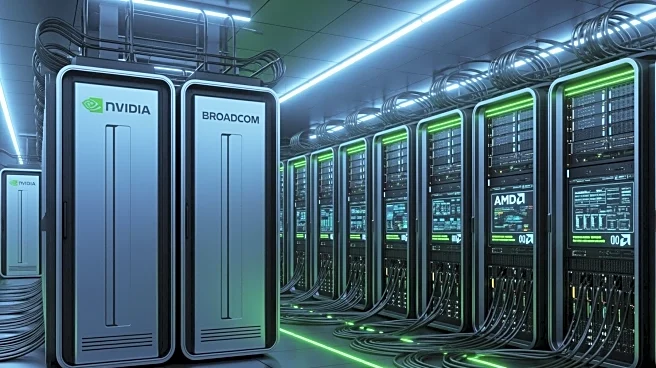What's Happening?
Nvidia, Broadcom, and AMD have each secured significant deals with OpenAI, a leading AI research lab known for developing ChatGPT. These agreements come as AI infrastructure spending is projected to reach
$4 trillion by 2030, according to Nvidia's CEO Jensen Huang. Nvidia plans to invest up to $100 billion in OpenAI, facilitating the deployment of 10 gigawatts of Nvidia systems starting in the second half of next year. AMD has agreed to deploy six gigawatts of its chips, with OpenAI receiving a warrant for up to 160 million shares, potentially giving it a 10% stake in AMD. Broadcom will co-develop systems with OpenAI, involving 10 gigawatts of its XPUs, although financial terms were not disclosed.
Why It's Important?
These deals highlight the growing demand for AI compute power and the strategic positioning of Nvidia, AMD, and Broadcom in the AI sector. Nvidia's substantial investment ensures its GPUs will be central to OpenAI's infrastructure, potentially boosting its revenue and stock price. AMD's agreement could lead to OpenAI holding a significant stake in the company, influencing its future growth and innovation. Broadcom's involvement underscores its expertise in networking and custom accelerators, expanding its footprint in AI applications. The partnerships reflect the increasing importance of AI in technology and business, with potential impacts on market dynamics and competitive strategies.
What's Next?
The deployment of these systems is set to begin in the second half of next year, marking a significant phase in AI infrastructure development. Nvidia's progressive investment strategy will support OpenAI's scale-up, while AMD's share vesting milestones could affect its market valuation. Broadcom's collaboration with OpenAI may lead to further advancements in networking solutions tailored for AI. As these projects unfold, stakeholders will closely monitor the impact on AI capabilities and the competitive landscape among chip manufacturers.
Beyond the Headlines
The deals may influence ethical considerations in AI development, particularly regarding the balance between innovation and responsible use of AI technologies. The partnerships could also drive long-term shifts in the semiconductor industry, emphasizing the need for sustainable and efficient AI solutions. As AI becomes more integrated into various sectors, cultural and legal dimensions related to data privacy and security may gain prominence.









